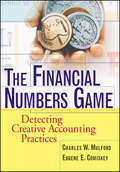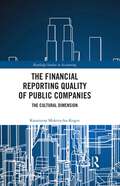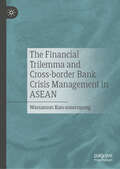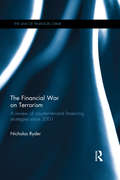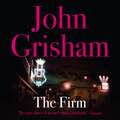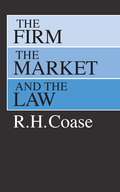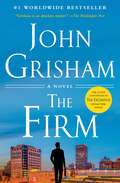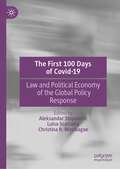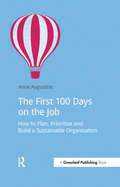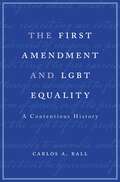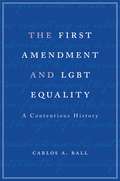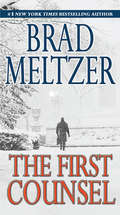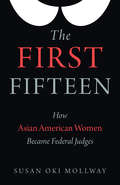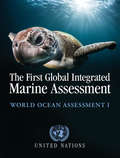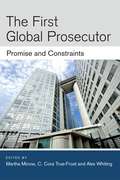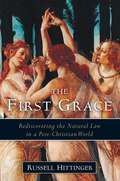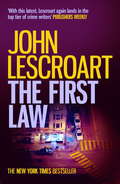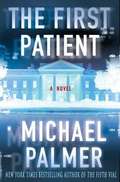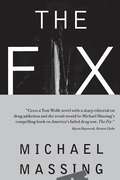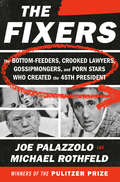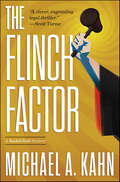- Table View
- List View
The Financial Numbers Game
by Charles W. Mulford Comiskey Eugene E.Praise for The Financial Numbers Game "So much for the notion 'those who can, do-those who can't, teach. ' Mulford and Comiskey function successfully both as college professors and real-world financial mercenaries. These guys know their balance sheets. The Financial Numbers Game should serve as a survival manual for both serious individual investors and industry pros who study and act upon the interpretation of financial statements. This unique blend of battle-earned scholarship and quality writing is a must-read/must-have reference for serious financial statement analysis. " -Bob Acker, Editor/Publisher, The Acker Letter "Wall Street's unforgiving attention to quarterly earnings presents ever-increasing pressure on CFOs to manage earnings and expectations. The Financial Numbers Game provides a clear explanation of the ways in which management can stretch, bend, and break accounting rules to reach the desired bottom line. This arms the serious investor or financial analyst with the healthy skepticism required to drive beyond reported results to a clear understanding of a firm's true performance. " -Mark Hurley, Managing Director, Training and Development Global Corporate and Investment Banking, Bank of America "After reading The Financial Numbers Game, I feel as though I've taken a master's course in financial statement analysis. Mulford and Comiskey's latest book should be required reading for anyone who is serious about fundamentally analyzing stocks. " -Harry Domash, Investing Columnist, San Francisco Chronicle and Publisher, Winning Investing The Financial Numbers Game identifies the steps businesses may take to misstate financial performance and helps its readers to identify those situations where reported results may not be what they seem.
The Financial Reporting Quality of Public Companies: The Cultural Dimension (Routledge Studies in Accounting)
by Katarzyna Mokrzycka-KogutThe factors determining the formation of accounting principles in different countries have long been studied. Cultural conditions have been identified as one of the reasons for national variations. This issue is particularly important when there is an effort to harmonise and standardise accounting principles, in order to create a uniform system, which may be adopted globally. This book explores the impact of cultural conditions on the financial reporting quality of public companies preparing financial statements according to International Accounting Standards (IAS) and International Financial Reporting Standards (IFRS). It discusses the main trends in the theory of capital and earnings in the economy. The book focuses on the relationship between the cultural dimensions under analysis, such as power distance, individualism/collectivism, masculinity/feminity, strong uncertainty/weak uncertainty, short/ long time orientation and indulgence/restraint, and the properties of the financial results; persistence, predictive value, accrual adjustments and earnings smoothing. It identifies the determinants - cultural conditions that have a statistically material impact, either positive or negative, on various attributes of the quality of the financial results of public companies. The book contains an up-to-date, in-depth description of the financial statements of public companies, across of variety of countries and sectors. The publication is addressed to researchers and students concerned with the functioning of capital markets and financial reporting quality and those who would like to expand their knowledge in the field of behavioural finance, as well as investors in capital markets.
The Financial Trilemma and Cross-border Bank Crisis Management in ASEAN
by Wassamon Kun-amornpongThis monograph utilises the case of cross-border bank crisis management in ASEAN to illustrate the challenges posed by the financial trilemma—the inherent tension between financial stability, national sovereignty, and financial integration. It provides an in-depth analysis of both legal and non-legal mechanisms employed by ASEAN member states and argues that existing frameworks remain insufficient for withstanding future financial crises. Structured across six chapters, the monograph covers key areas including the role of law in the financial trilemma, cross-border banking supervision, bank resolution regimes, deposit insurance systems, and public assistance and fiscal backstops. It concludes with seven policy recommendations aimed at guiding ASEAN toward a more robust framework for mitigating systemic risk and minimising the financial trilemma. The monograph also examines the European Union&’s legal tools for cross-border bank crisis management, offering comparative insights into both the strengths and limitations of legal mechanisms in practice.
The Financial War on Terrorism: A Review of Counter-Terrorist Financing Strategies Since 2001 (The Law of Financial Crime)
by Nicholas RyderOn September 11, 2001, 19 terrorists committed the largest and deadliest terrorist attack in the United States of America. The response from the inter-national community, and in particular the US, was swift. President George Bush declared what has commonly been referred to as either the ‘War on Terror’ or the ‘Global War on Terror’ on September 20, 2001. Four days later, he instigated the ‘Financial War on Terrorism’. This book defines and identifies the so-called ‘Financial War on Terrorism’. It provides a critical review of the impact of counter-terrorist financing strategies enacted by both individual jurisdictions and international organisations. Taking a comparative approach, the book highlights the levels of compliance in each selected jurisdiction and organisation with the requirements of the ‘Financial War on Terrorism’. The book analyses measures introduced by the United Nations, including the UN sanctions against terrorists and the operation of its anti-terrorist sanctions committees, and the Recommendations of the Financial Action Task Force. It also reviews the counter-terrorist financing measures of the European Union and the Council of Europe, paying particular attention to the Framework Decisions on Combating Terrorism, the Council Common Positions on Combating Terrorism and the EU Anti-Terrorism Sanctions Regime. The book goes on to review the measures put in place in the US following September 11, 2001. Offering a much-needed legal analysis of the measures enacted under the ‘Financial War on Terrorism’, this book is a valuable resource for those researching in law, terrorism studies, criminal justice, and finance.
The Firm
by John GrishamAt the top of his class at Harvard Law, he had his choice of the best in America. He made a deadly mistake. When Mitch McDeere signed on with Bendini, Lambert & Locke of Memphis, he thought he and his beautiful wife, Abby, were on their way. The firm leased him a BMW, paid off his school loans, arranged a mortgage and hired him a decorator. Mitch McDeere should have remembered what his brother Ray -- doing fifteen years in a Tennessee jail -- already knew. You never get nothing for nothing. Now the FBI has the lowdown on Mitch's firm and needs his help. Mitch is caught between a rock and a hard place, with no choice -- if he wants to live.(P)2009 Random House, LLC
The Firm the Market and the Law
by R. H. CoaseFew other economists have been read and cited as often as R. H. Coase has been, even though, as he admits, "most economists have a different way of looking at economic problems and do not share my conception of the nature of our subject. " Coase's particular interest has been that part of economic theory that deals with firms, industries, and markets—what is known as price theory or microeconomics. He has always urged his fellow economists to examine the foundations on which their theory exists, and this volume collects some of his classic articles probing those very foundations. "The Nature of the Firm" (1937) introduced the then-revolutionary concept of transaction costs into economic theory. "The Problem of Social Cost" (1960) further developed this concept, emphasizing the effect of the law on the working of the economic system. The remaining papers and new introductory essay clarify and extend Coarse's arguments and address his critics. "These essays bear rereading. Coase's careful attention to actual institutions not only offers deep insight into economics but also provides the best argument for Coase's methodological position. The clarity of the exposition and the elegance of the style also make them a pleasure to read and a model worthy of emulation. "—Lewis A. Kornhauser, Journal of Economic Literature Ronald H. Coase was awarded the Nobel Prize in Economic Science in 1991.
The Firm: A Novel (The Firm Series #1)
by John Grisham#1 WORLDWIDE BESTSELLER • The iconic legal thriller that launched the career of America&’s favorite storyteller, hailed as &“an absolute master&” (The Washington Post) &“[An] ingenious man-in-the-middle thriller.&”—Entertainment Weekly Mitch McDeere has worked hard to get where he is: third in his class at Harvard Law. Aggressively recruited by all the top firms, and initially headed for Wall Street, Mitch surprises everyone by joining Bendini, Lambert & Locke, a very private, very rich tax firm in Memphis. Mitch and his wife, Abby, move to Tennessee and quickly settle into their new life: they&’re young, happy, and on the fast track. Or so they think. Soon, though, Mitch senses trouble: two of the partners die in a suspicious diving accident off Grand Cayman; the firm&’s management is overly proud of the fact that no one has ever resigned; and security measures at the firm, even for a company with billionaire clients, are more than a little stringent. Then, suddenly, Mitch&’s vague suspicions come to life. The FBI has the lowdown on Mitch&’s firm and needs his help. Now Mitch is caught between a rock and a hard place. The FBI will bust him if he doesn&’t cooperate, and the firm will kill him if he does. There&’s no way out. Or is there? The story continues in The Exchange, the &“breathtaking&” (The Wall Street Journal) sequel to The Firm!
The First 100 Days of Covid-19: Law and Political Economy of the Global Policy Response
by Aleksandar Stojanović Luisa Scarcella Christina R. MosalagaeThis book provides a novel in-depth study of the early pandemic response policy at the intersection of political economy and law. It explores: (1) whether the responses to COVID-19 were democratically accountable; (2) the ways in which new surveillance and enforcement techniques were adopted; (3) the new monetary and fiscal policies which were implemented; (4) the ways in which employed and unemployed persons were differently impacted by the new policies; and (5) how companies were economically sustained through the pandemic. A compelling look at what happens to societies when disaster strikes, this book will be of interest to legal scholars, political scientists and economists.
The First 100 Days on the Job: How to plan, prioritize and build a sustainable organisation
by Anne AugustineThe First 100 Days on the Job is for sustainability leaders – in organizations of any size or sector – who want to make an impact in their first one hundred days on the job, and set themselves up for long-term success. In the absence of complete and perfect information you will be expected to lead and to act, often in partnership with other businesses, government and civil society, and almost certainly by building relationships across functions, departments and geographies within your own organization. It is the timing of your decision making that will set you apart.This short guide offers: 1) A process to make the most of your first 10, 60, 90 and 100 days 2) Some practical tools you can use to set priorities and manage your programme 3) Sources of research and information for measuring the impacts of your organization 4) A heavy dose of realism about what can be done, to keep you sane – and links to some practical support and inspiration.
The First Amendment Bubble: How Privacy and Paparazzi Threaten a Free Press
by Amy GajdaFor decades, privacy took a back seat to the public's right to know. But as the Internet and changing journalism have made it harder to distinguish news from titillation, U.S. courts are showing new resolve in protecting individuals from invasive media scrutiny. As Amy Gajda shows, this judicial backlash is now impinging on mainstream journalists.
The First Amendment and LGBT Equality: A Contentious History
by Carlos A. BallCarlos A. Ball argues that as progressives fight the First Amendment claims of religious conservatives and other LGBT opponents, they should take care not to forget the crucial role the First Amendment played in the early decades of the movement, and not to erode the safeguards of liberty that allowed LGBT rights to exist in the first place.
The First Amendment and LGBT Equality: A Contentious History
by Carlos A. BallCarlos A. Ball argues that as progressives fight the First Amendment claims of religious conservatives and other LGBT opponents, they should take care not to forget the crucial role the First Amendment played in the early decades of the movement, and not to erode the safeguards of liberty that allowed LGBT rights to exist in the first place.
The First Counsel
by Brad MeltzerIf ever a book was destined to head straight to the bestseller list, this is it. Brad Meltzer, whose previous books, The Tenth Justice and Dead Even , did extremely well, has fashioned a thriller that has everything: death and deceit in the corridors of power, with dirty deeds leading straight to the top of the White House inner circle. Michael Garrick is a young man with a dream job. As a lawyer in the White House, he rubs shoulders with the top men and women in the country. And that includes Shadow, the Secret Service code name for the First Daughter, Nora Hartson, who likes Michael a lot. It's difficult dating the First Daughter; Michael and Nora are never alone, and Nora has a rebellious streak about the constant surveillance she is under, so it is no surprise when she encourages Michael to lose the tail when they are out one evening. But when they see Edgar Simon, the President's chief adviser and Michael's boss, in a gay bar, they decide to follow him. What they see will put Michael's career--and his life--in danger. Back at the White House, Michael talks to one of his colleagues about the legal and ethical issues of the Edgar Simon situation. She says she will get back to him, but before she does she is murdered, and Michael is on the list of suspects. Nora could corroborate his alibi, but suddenly it's impossible to get hold of her. She doesn't answer his calls and, when Michael finally does speak to her, she doesn't want to be involved, leaving him baffled and vulnerable. This is a roller coaster of a thriller, one with a unique view of the day-to-day dealings in the most powerful house in the world.
The First Counsel
by Brad MeltzerBestselling author Brad Meltzer delivers a mesmerizing, suspenseful novel where a young White House attorney gets caught in a deadly conspiracy when he gets too close to the daughter of the President.White House lawyer Michael Garrick has a relatively anonymous position at a very public address. That is, until he starts dating Nora Harston (Secret Service code name: Shadow), the sexy and dangerously irresistible daughter of the president. The confident young attorney who starts feeling like the First Counsel thinks he can handle the pressure until, out on a date, Nora and Michael see something they shouldn't. And when a body is discovered and Michael is the suspected killer, he finds himself on the run. Now he must find a way to prove his innocence.
The First Fifteen: How Asian American Women Became Federal Judges
by Susan Oki MollwayIn 1998, an Asian woman first joined the ranks of federal judges with lifetime appointments. It took ten years for the second Asian woman to be appointed. Since then, however, over a dozen more Asian women have received lifetime federal judicial appointments. This book tells the stories of the first fifteen. In the process, it recounts remarkable tales of Asian women overcoming adversity and achieving the American dream, despite being the daughters of a Chinese garment worker, Japanese Americans held in internment camps during World War II, Vietnamese refugees, and penniless Indian immigrants. Yet The First Fifteen also explores how far Asian Americans and women still have to go before the federal judiciary reflects America as a whole. In a candid series of interviews, these judges reflect upon the personal and professional experiences that led them to this distinguished position, as well as the nerve-wracking political process of being nominated and confirmed for an Article III judgeship. By sharing their diverse stories, The First Fifteen paints a nuanced portrait of how Asian American women are beginning to have a voice in determining American justice.
The First Global Integrated Marine Assessment: World Ocean Assessment I
by United NationsThe World Ocean Assessment - or, to give its full title, The First Global Integrated Marine Assessment - is the outcome of the first cycle of the United Nations' Regular Process for Global Reporting and Assessment of the State of the Marine Environment, including Socioeconomic Aspects. The Assessment provides vital, scientifically-grounded bases for the consideration of ocean issues, including climate change, by governments, intergovernmental agencies, non-governmental agencies and all other stakeholders and policymakers involved in ocean affairs. Together with future assessments and related initiatives, it will support the implementation of the recently adopted 2030 Agenda for Sustainable Development, particularly its ocean-related goals. Moreover, it will also form an important reference text for marine science courses. A prestigious and comprehensive report from the United Nations, with contributions from hundreds of the world's experts on the oceans. Provides the first integrated assessment of the state of the world's ocean, enabling policy makers and all stakeholders to consider for the first time the global and integrated effect on the ocean of decisions that they make. Identifies gaps in knowledge of the ocean and related human activities, helping policymakers and all stakeholders to identify and prioritize areas for action, and input to the Sustainable Development Goals.
The First Global Prosecutor: Promise And Constraints
by Martha Minow C. Cora True-Frost Alex WhitingThe establishment of the International Criminal Court (ICC) gave rise to the first permanent Office of the Prosecutor (OTP), with independent powers of investigation and prosecution. Elected in 2003 for a nine-year term as the ICC's first Prosecutor, Luis Moreno Ocampo established policies and practices for when and how to investigate, when to pursue prosecution, and how to obtain the cooperation of sovereign nations. He laid a foundation for the OTP's involvement with the United Nations Security Council, state parties, nongovernmental organizations, victims, the accused, witnesses, and the media. This volume of essays presents the first sustained examination of this unique office and offers a rare look into international justice. The contributors, ranging from legal scholars to practitioners of international law, explore the spectrum of options available to the OTP, the particular choices Moreno Ocampo made, and issues ripe for consideration as his successor, Fatou B. Bensouda, assumes her duties. The beginning of Bensouda's term thus offers the perfect opportunity to examine the first Prosecutor's singular efforts to strengthen international justice, in all its facets.
The First Grace: Rediscovering the Natural Law in a Post-Christian World
by Russell HittingerThe last two decades or so have seen a marked resurgence of interest in natural law thought, a movement in which Russell Hittinger has been a major figure. The First Grace: Rediscovering the Natural Law in a Post-Christian World reveals the power and subtlety of Hittinger's philosophical work and cultural criticism. Whether discussing the nature of liberalism, the constitutional and moral problems posed by judicial usurpation, or the dangers of technology, Hittinger convincingly demonstrates that in our post-Christian world it is more crucial than ever that we recover older, wiser notions of the concepts of freedom and law - and that we see that to place these two concepts in opposition is to misunderstand both profoundly.
The First Law: A dark and twisted crime thriller (Dismas Hardy)
by John LescroartThe first law. The last resort. Forsaken by the law, Hardy, Glitsky and even their families are caught in the crossfire, under direct threat. The First Law is the ninth book in John Lescroart's Dismas Hardy series; perfect for fans of John Sandford and Michael Lister. 'Lescroart's expert crafting turns this legal thriller into quite a wild ride' - BooklistPatrol Specials, a private police force that keeps watch for paying clients, date back to the wilder days of San Francisco's past. Unfortunately, Sam Silverman, an elderly shop owner, could no longer afford Patrol Special protection, and now he may have paid with his life. But Lt. Abe Glitsky, stuck in a paper-pushing job after being injured on duty, is hitting brick walls as he tries to get help from homicide. And his friend, Dismas Hardy, putting together a high-stakes lawsuit against the Patrol Specials, suddenly finds himself defending a friend and local bar owner who's been accused of Silverman's death. Now, blocked at every turn, both Hardy and Glitsky may be forced to protect not only themselves, but their nearest and dearest - as they step cautiously into a world where the only law is survival...What readers are saying about The First Law:'The First Law takes our relationship with the characters to a new level''Gripping, tense and shocking''The darkest book Lescroart ever wrote'
The First Patient
by Michael PalmerFrom the blockbuster New York Times bestselling author comes a high-concept, high-octane thriller at the crossroads of presidential politics and cutting-edge medicine. Gabe Singleton and Andrew Stoddard were roommates at the Naval Academy in Annapolis years ago. Today, Gabe is a country doctor and his friend Andrew has gone from war hero to governor to President of the United States. One day, while the United States is embroiled in a bitter presidential election campaign, Marine One lands on Gabe's Wyoming ranch, and President Stoddard delivers a disturbing revelation and a startling request. His personal physician has suddenly and mysteriously disappeared, and he desperately needs Gabe to take the man's place. Despite serious misgivings, Gabe agrees to come to Washington. It is not until he is ensconced in the White House medical office that Gabe realizes there is strong evidence that the President is going insane. Facing a crisis of conscience-as President Stoddard's physician, he has the power to invoke the Twenty-fifth Amendment to transfer presidential power to the Vice President- Gabe uncovers increasing evidence that his friend's condition may not be due to natural causes. Who? Why? And how? The President's life is at stake. A small-town doctor suddenly finds himself in the most powerful position on earth, and the safety of the world is in jeopardy. Gabe Singleton must find the answers, and the clock is ticking. With Michael Palmer's trademark medical details, and steeped in meticulous political insider knowledge, The First Patient is an unforgettable story of suspense.
The First Rumpole Omnibus
by John MortimerThe first set of stories of John Mortimer's character Horace Rumpole, and various defendants, fellow barristers, unsympathetic juges, and Horace's wife Hilda-- "She Who Must Be Obeyed".
The Fix
by Michael MassingMassing confronts the failure of the "war on drugs" and documents the much greater potential for reclaiming drug addicts that can be had by treatment and support rather than criminalization, and at a lower cost than building ever more prisons and militarizing drug source countries in Latin America.
The Fixers: The Bottom-Feeders, Crooked Lawyers, Gossipmongers, and Porn Stars Who Created the 45th President
by Joe Palazzolo Michael RothfeldThe shocking, definitive account of the lawyers and media tycoons who enabled the rise of Donald Trump, featuring new revelations from a Pulitzer Prize-winning Wall Street Journal team With his blunt-force fame and the myths he&’s propagated about himself, Donald Trump has always moved in a world of gossip barons, crooked lawyers, and porn stars. But when he became the Republican nominee for the presidency in 2016, all of these characters crawled out from the underbelly of Trump&’s stardom and stumbled onto the global stage with him. In The Fixers, Joe Palazzolo and Michael Rothfeld have produced a deeply reported and exquisitely drawn portrait of that world, full of secret phone calls, hidden texts, and desperate deals, unearthing the practice of &“catch and kill&” by which Trump surrogates paid hush money to cover up his affairs, and detailing Trump&’s historic relationship with his fixers—from his early, influential relationship with Roy Cohn to his reliance on Michael Cohen, National Enquirer publisher David Pecker, and former New York mayor Rudy Giuliani. It traces the arc of their interactions from the 1970s through the 2016 campaign and beyond. It is a distinctly American saga that navigates the worlds of reality TV, cash-for-trash tabloids, single-shingle law shops, celebrity bashes, high-end real estate, pornography, and politics. The characters and settings of this book are part of a vulgar circus that crisscrosses the country, from New York to L.A. to D.C. Terrifying, darkly comic, and compulsively readable, The Fixers is an epic political adventure in which greed, corruption, lust, and ambition collide, and that leads, ultimately, to the White House.Advance praise for The Fixers &“Of the dozens of books chronicling Donald Trump&’s presidency, The Fixers is destined to sit atop the pile. It has everything you look for in a political page-turner: Colorful characters, intrigue, sex, corruption and—unlike much of the Trump canon—meticulous, factual reporting by two ace reporters. What a read!&”—John Carreyrou, New York Times bestselling author of Bad Blood
The Flinch Factor (Attorney Rachel Gold Mysteries #8)
by Michael A. Kahn"Pick it up, but only if you can afford to lose a night's sleep, because you won't be able to put it down." —Steve Martini, author of the Paul Madriani novelsSeveral years have passed since we last saw stunning, savvy attorney Rachel Gold. Now she is a mother, a widow, and a reluctant participant in a lost cause: the Frankenstein Case. She represents a blue-collar neighborhood fighting a developer intent on bulldozing their homes to erect a gated community. Rachel's strategy will be based on the wacky judge on the case, known to the St. Louis Bar as "The Flinch Factor."Then Rachel gains a new client: Susannah, sister of Nick Moran, local heartthrob. Nick has been murdered, found slumped on the front seat of his pickup along an isolated lane known as Gay Way. His female groupies are, to say the least, stunned. His sister smells foul play. A skeptical Rachel agrees to check it out and turns up facts suggesting that Nick's death was not an accident. Are Nick's death and her Frankenstein case somehow related? Can Rachel uncover the truth before more lives are lost?
The Floor in Congressional Life
by Andrew J. TaylorThe House and the Senate floors are the only legislative forums where all members of the U. S. Congress participate and each has a vote. Andrew J. Taylor explores why floor power and floor rights in the House are more restricted than in the Senate and how these restrictions affect the legislative process. After tracing the historical development of floor rules, Taylor assesses how well they facilitate a democratic legislative process---that is, how well they facilitate deliberation, transparency, and widespread participation. Taylor not only compares floor proceedings between the Senate and the House in recent decades; he also compares recent congressional proceedings with antebellum proceedings. This unique, systematic analysis reveals that the Senate is generally more democratic than the House---a somewhat surprising result, given that the House is usually considered the more representative and responsive of the two. Taylor concludes with recommendations for practical reforms designed to make floor debates more robust and foster representative democracy.
